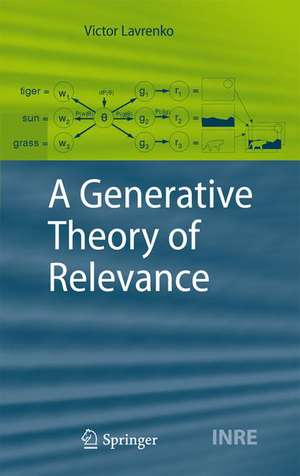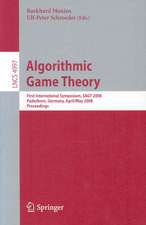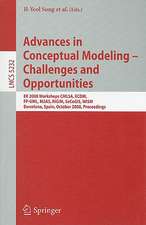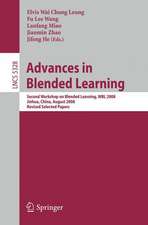A Generative Theory of Relevance: The Information Retrieval Series, cartea 26
Autor Victor Lavrenkoen Limba Engleză Hardback – 25 noi 2008
Lavrenko does not attempt to bring forth a new definition of relevance, nor provide arguments as to why any particular definition might be theoretically superior or more complete. Instead, he takes a widely accepted, albeit somewhat conservative definition, makes several assumptions, and from them develops a new probabilistic model that explicitly captures that notion of relevance. With this book, he makes two major contributions to the field of information retrieval: first, a new way to look at topical relevance, complementing the two dominant models, i.e., the classical probabilistic model and the language modeling approach, and which explicitly combines documents, queries, and relevance in a single formalism; second, a new method for modeling exchangeable sequences of discrete random variables which does not make any structural assumptions about the data and which can also handle rare events.
Thus his book is of major interest to researchers and graduate students in information retrieval who specialize in relevance modeling, ranking algorithms, and language modeling.
| Toate formatele și edițiile | Preț | Express |
|---|---|---|
| Paperback (1) | 641.67 lei 43-57 zile | |
| Springer Berlin, Heidelberg – 20 noi 2010 | 641.67 lei 43-57 zile | |
| Hardback (1) | 648.59 lei 43-57 zile | |
| Springer Berlin, Heidelberg – 25 noi 2008 | 648.59 lei 43-57 zile |
Din seria The Information Retrieval Series
- 20%
 Preț: 1908.14 lei
Preț: 1908.14 lei - 20%
 Preț: 651.89 lei
Preț: 651.89 lei - 20%
 Preț: 988.32 lei
Preț: 988.32 lei - 20%
 Preț: 646.80 lei
Preț: 646.80 lei - 20%
 Preț: 2189.11 lei
Preț: 2189.11 lei - 20%
 Preț: 652.22 lei
Preț: 652.22 lei - 15%
 Preț: 642.18 lei
Preț: 642.18 lei - 20%
 Preț: 1900.73 lei
Preț: 1900.73 lei - 20%
 Preț: 652.41 lei
Preț: 652.41 lei - 20%
 Preț: 647.79 lei
Preț: 647.79 lei - 20%
 Preț: 944.77 lei
Preț: 944.77 lei - 20%
 Preț: 652.07 lei
Preț: 652.07 lei - 20%
 Preț: 1444.03 lei
Preț: 1444.03 lei - 20%
 Preț: 990.12 lei
Preț: 990.12 lei - 15%
 Preț: 644.82 lei
Preț: 644.82 lei - 20%
 Preț: 646.95 lei
Preț: 646.95 lei - 20%
 Preț: 653.56 lei
Preț: 653.56 lei - 20%
 Preț: 768.06 lei
Preț: 768.06 lei - 20%
 Preț: 648.59 lei
Preț: 648.59 lei - 20%
 Preț: 326.64 lei
Preț: 326.64 lei - 20%
 Preț: 776.69 lei
Preț: 776.69 lei - 20%
 Preț: 1276.08 lei
Preț: 1276.08 lei - 20%
 Preț: 697.27 lei
Preț: 697.27 lei - 20%
 Preț: 335.52 lei
Preț: 335.52 lei - 20%
 Preț: 658.98 lei
Preț: 658.98 lei - 20%
 Preț: 646.12 lei
Preț: 646.12 lei
Preț: 648.59 lei
Preț vechi: 810.74 lei
-20% Nou
Puncte Express: 973
Preț estimativ în valută:
124.12€ • 128.80$ • 103.74£
124.12€ • 128.80$ • 103.74£
Carte tipărită la comandă
Livrare economică 17-31 martie
Preluare comenzi: 021 569.72.76
Specificații
ISBN-13: 9783540893639
ISBN-10: 3540893636
Pagini: 220
Ilustrații: XX, 197 p. 31 illus.
Dimensiuni: 155 x 235 x 23 mm
Greutate: 0.5 kg
Ediția:2009
Editura: Springer Berlin, Heidelberg
Colecția Springer
Seria The Information Retrieval Series
Locul publicării:Berlin, Heidelberg, Germany
ISBN-10: 3540893636
Pagini: 220
Ilustrații: XX, 197 p. 31 illus.
Dimensiuni: 155 x 235 x 23 mm
Greutate: 0.5 kg
Ediția:2009
Editura: Springer Berlin, Heidelberg
Colecția Springer
Seria The Information Retrieval Series
Locul publicării:Berlin, Heidelberg, Germany
Public țintă
ResearchCuprins
Relevance.- A Generative View of Relevance.- Generative Density Allocation.- Retrieval Scenarios.- Conclusion.
Recenzii
From the reviews:
"Lavrenko introduces a new model of relevance for information retrieval (IR). He introduces a new way of looking at topical relevance with a new way of modeling topical content. … The book is divided into six chapters. … The index is adequate … . The lists of figures and tables in the tables of contents are very useful for quick reference. IR professionals and graduate students are the intended audience … ." (E. Y. Lee, ACM Computing Reviews, May, 2009)
“The goal of this book is to provide a third alternative to the classical probabilistic model and the language modeling approach. It introduces a model of retrieval that treats relevance as a common generative process underlying both documents and queries. … To researchers and graduate students the book offers a new way of thinking about relevance, a number of interesting facts about existing models, and some explanations for strange experimental observations.” (Antonín Ríha, Zentralblatt MATH, Vol. 1168, 2009)
“In ‘A generative Theory of Relevance’, Victor Lavrenko analyzes in depth both the theory and effectiveness of pseudo-relevance feedback. … The combination and thoroughness of the theoretical and experimental discussions make this book an essential read for both the information retrieval theoretician as well as the practitioner. … By the end of the book, the reader is comfortable enough with the techniques to apply them to new domains. … Lavrenko makes nice theoretical and empirical contributions to the state of the art.” (Fernando Diaz, Information Retrieval, Vol. 13, 2010)
"Lavrenko introduces a new model of relevance for information retrieval (IR). He introduces a new way of looking at topical relevance with a new way of modeling topical content. … The book is divided into six chapters. … The index is adequate … . The lists of figures and tables in the tables of contents are very useful for quick reference. IR professionals and graduate students are the intended audience … ." (E. Y. Lee, ACM Computing Reviews, May, 2009)
“The goal of this book is to provide a third alternative to the classical probabilistic model and the language modeling approach. It introduces a model of retrieval that treats relevance as a common generative process underlying both documents and queries. … To researchers and graduate students the book offers a new way of thinking about relevance, a number of interesting facts about existing models, and some explanations for strange experimental observations.” (Antonín Ríha, Zentralblatt MATH, Vol. 1168, 2009)
“In ‘A generative Theory of Relevance’, Victor Lavrenko analyzes in depth both the theory and effectiveness of pseudo-relevance feedback. … The combination and thoroughness of the theoretical and experimental discussions make this book an essential read for both the information retrieval theoretician as well as the practitioner. … By the end of the book, the reader is comfortable enough with the techniques to apply them to new domains. … Lavrenko makes nice theoretical and empirical contributions to the state of the art.” (Fernando Diaz, Information Retrieval, Vol. 13, 2010)
Notă biografică
Victor Lavrenko is a lecturer at the School of Informatics at the University of Edinburgh, Scotland, UK. He received his Ph.D. in Computer Science from the University of Massachusetts Amherst in 2004. His dissertation focused on a generative framework for modeling relevance in Information Retrieval. In 2005 he joined the Center for Intelligent Information Retrieval at UMass as a post-doctoral research associate, working on statistical models for searching large semi-structured databases. From 2006 Victor worked as a language technology consultant for the Credit Suisse Group. Since 2000, he has served as a reviewer for SIGIR, CIKM, NAACL/HLT, IJCAI and NIPS conferences.
Victor's current research interests include formal models for searching text in multiple languages, annotating and retrieving images, and detecting and tracking novel events in the news.
Victor's current research interests include formal models for searching text in multiple languages, annotating and retrieving images, and detecting and tracking novel events in the news.
Textul de pe ultima copertă
A modern information retrieval system must have the capability to find, organize and present very different manifestations of information – such as text, pictures, videos or database records – any of which may be of relevance to the user. However, the concept of relevance, while seemingly intuitive, is actually hard to define, and it's even harder to model in a formal way.
Lavrenko does not attempt to bring forth a new definition of relevance, nor provide arguments as to why any particular definition might be theoretically superior or more complete. Instead, he takes a widely accepted, albeit somewhat conservative definition, makes several assumptions, and from them develops a new probabilistic model that explicitly captures that notion of relevance. With this book, he makes two major contributions to the field of information retrieval: first, a new way to look at topical relevance, complementing the two dominant models, i.e., the classical probabilistic model and the language modeling approach, and which explicitly combines documents, queries, and relevance in a single formalism; second, a new method for modeling exchangeable sequences of discrete random variables which does not make any structural assumptions about the data and which can also handle rare events.
Thus his book is of major interest to researchers and graduate students in information retrieval who specialize in relevance modeling, ranking algorithms, and language modeling.
Lavrenko does not attempt to bring forth a new definition of relevance, nor provide arguments as to why any particular definition might be theoretically superior or more complete. Instead, he takes a widely accepted, albeit somewhat conservative definition, makes several assumptions, and from them develops a new probabilistic model that explicitly captures that notion of relevance. With this book, he makes two major contributions to the field of information retrieval: first, a new way to look at topical relevance, complementing the two dominant models, i.e., the classical probabilistic model and the language modeling approach, and which explicitly combines documents, queries, and relevance in a single formalism; second, a new method for modeling exchangeable sequences of discrete random variables which does not make any structural assumptions about the data and which can also handle rare events.
Thus his book is of major interest to researchers and graduate students in information retrieval who specialize in relevance modeling, ranking algorithms, and language modeling.
Caracteristici
Includes supplementary material: sn.pub/extras














